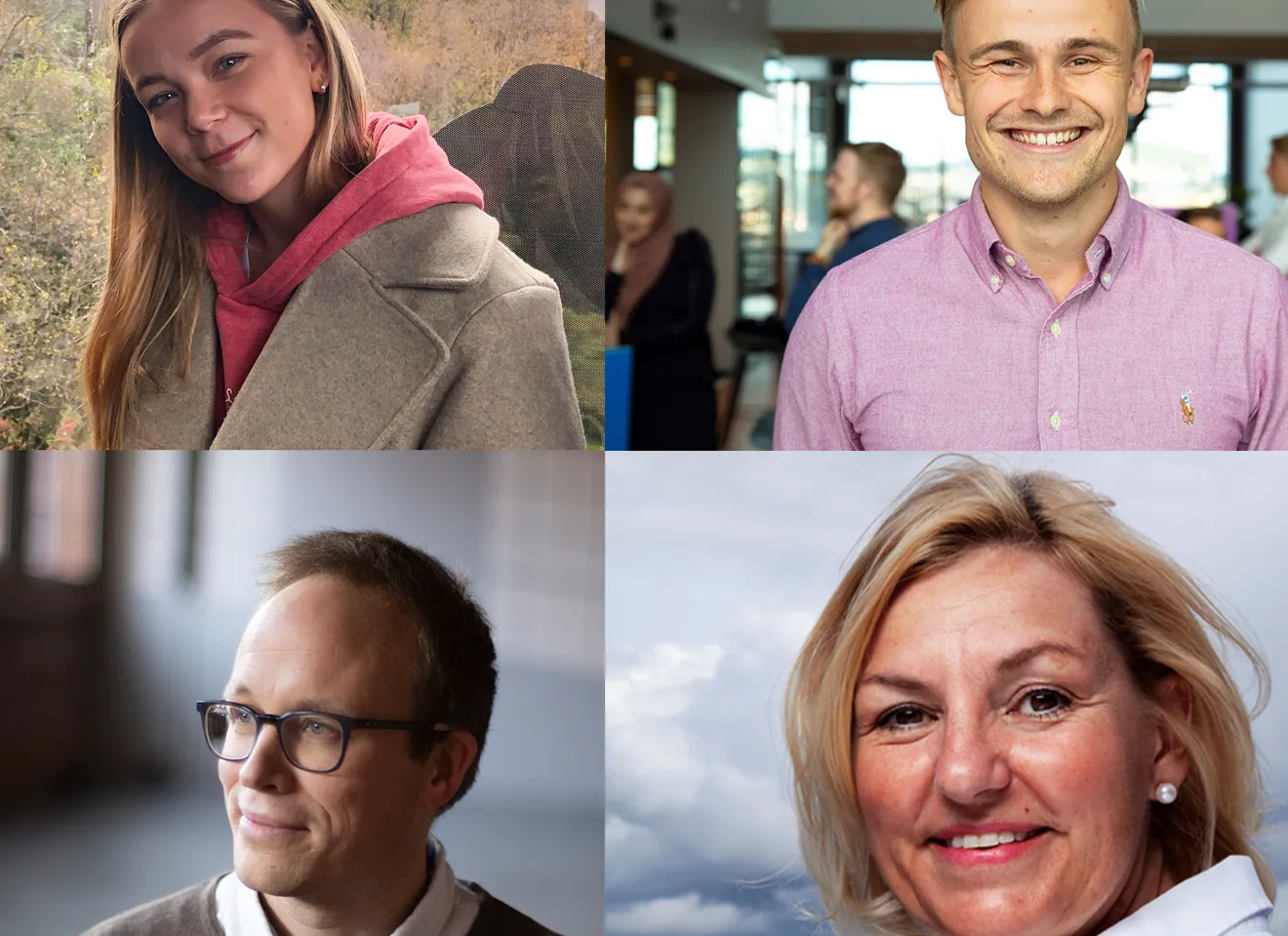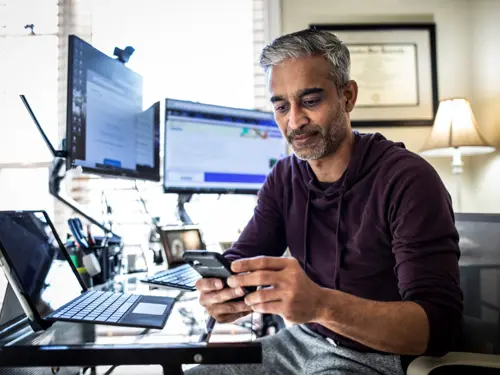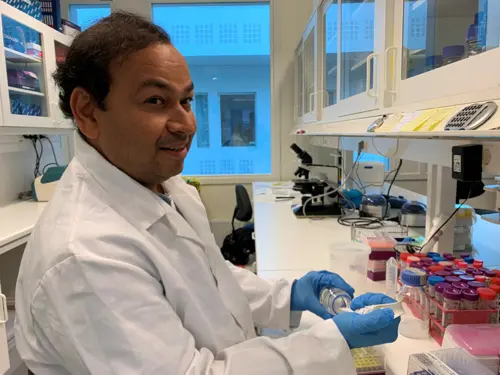
News
The year that went downhill fast – this is how they experienced it
Eli Grimsby is impressed with how fast people figured out how to convert to a digital workday. Ivar F. Ihle thinks that the Corona virus will affect us for years to come. Casper Andersen Rødsrud points out how important social contact is for our mental health, while Karoline Lewinsen hopes that new students will soon be able to get a taste of what ‘real’ student life is like.
A little over one year ago, Prime Minister Erna Solberg told us on March 12th that Norwegian society had to shut down. Since this time many of us have felt a high level of insecurity as both our working and social lives were suddenly turned upside down. Some workers were laid off, home offices and online meetings started, spending Easter vacation at your cabin was forbidden, summer vacations were cancelled, and closed schools and kindergartens meant that parents had to begin their own at-home schooling. Wave after wave of infections have hit us. And although vaccinations have started, we’re still not out of the water. As Øystein Sunde sang in his 1970s song: «This was the year that everything went downhill fast».
We’ve asked four Tekna members in different industries about what this year has been like for them: manager, representative, new employee and student.
The manager: Have to re-organize and merge 600 co-workers who are working remotely

Name: Eli Grimsby (58)
Position: CEO of Oslobygg KF
Education: Civil Engineer in construction/NTH
On the first day of August last year, Tekna member Eli Grimsby started as CEO of Oslobygg KF, Oslo municipality’s new real estate company. She moved there after having been CEO of Kultur- og idrettsbygg Oslo KF, and has 25 years of management experience from having held several positions in Oslo municipality.
– What has your experience of ‘the Corona year’ been like as a top-level manager?
– The first thing that strikes me is the impressive speed and ability to change we saw all over the country – we all figured out how to convert to a digital workday in just a few weeks. The whole process went a lot faster than I could’ve ever imagined.
– Personally speaking, this has been a different kind of year in many ways. Since the end of last summer, I’ve been responsible for establishing Oslo municipality’s big new real estate company: Oslobygg KF, which will be operational starting in the fall of 2021. It’s been demanding to lead this process from my home office, where we are reorganizing and merging almost 600 co-workers who are currently working remotely. Losing the opportunity to have in-person meetings, excursions and gatherings with employees has required new initiatives and creative problem-solving. Most of all, I’ve been impressed by all of the employees who’ve kept at it and put in a phenomenal amount of work under difficult circumstances.
– How do you think this year will change working life in the future?
– I think we’ll see developments towards creating a more digital and flexible working life. The way we work will probably change in several ways. We’ll communicate and interact more across departments, and we won’t have to travel as much. Experiences from this year have shown us that technological solutions give us the opportunity to do our work regardless of situation, time or place.
– What do you think we can learn from this year that’ll be useful in the future?
– This period’s shown us that many work tasks can be done no matter where we are. Digital developments have taught us a lot and raised our skills a lot, too, which will be important to have in the future. We’ve seen that we can meet challenges without having to travel, so we won’t have to travel for work as often as before. Using online meetings more often will save us a lot of time, and more people will be able to take part in them, so in time we’ll see the financial and environmental benefits of this change.
– At the same time, I think we’ve realized the importance of seeing each other and getting together in person. A lot of dynamics, discussions and social relationships disappear when just looking at each other on a screen. I think a lot of people have felt a longing for community and their own colleagues, and that after this is all over, we’ll appreciate each other in a different way. Maybe this has also helped increase the focus on trust-based management. When you work online, you depend on the trust between individual co-workers and their supervisors.
– We’ve learned a lot and will take the new knowledge and experiences from this year with us moving forward – and I think that we’re all looking forward to the day we’ll once again be able to get together with our colleagues in «the old way», too.
The representative: – The layoffs came fast
Name: Ivar-Andre F. Ihle (41)
Position: Principal Engineer/Head Tekna representative for Kongsberg Maritime
Education: Civil Engineer/PhD in technical cybernetics/ NTNU

As head representative in Kongsberg Maritime, it was a tough time for Ivar-Andre F. Ihle, especially at the start of the pandemic when the company decided to lay off several of his co-workers.
– What has your experience of ‘the Corona year’ been like as a Tekna representative?
– As a representative I often have several short meetings to write in my calendar besides my regular work. There’s a bit less time for discussion with the other representatives before and after meetings. There’s also a lot less contact with members when you’re working remotely. While it was tough at first to have discussions about layoffs and changes only via Microsoft Teams, this situation has gotten better. But it’s still important to be able to meet people in in-person meetings so we can communicate better. The situation looked really critical for the company at the start, both at home and abroad. The layoffs came fast, but then started to slow down. The situation improved somewhat over the course of the year, but Corona will affect us for many years to come.
– How do you think this year will change working life in the future?
– A higher level of consciousness and opportunities to have a ‘hybrid office’ with some days at home and some days at the office. Being physically present in the same location is sometimes advantageous, but it’s not a must, either.
– What do you think we can learn from this year that’ll be useful in the future?
– People who can work from home are lucky. We’ve finally learned what a good, online meeting involves. We know that working remotely functions well, but we really notice that there’s something we’re missing, too. We’ve learned a bit more about how difficult it is to separate work and leisure when our work PC is always around. But this has also maybe made us more aware that we have the chance to go out for a walk in the sunshine and fresh air, even in the middle of winter.
The new employee: – Helped my mental health to be able to meet others in person

Name: Casper Andersen Rødsrud (26)
Position: Solution Building Engineer in Sopra Steria (6 months), then Development Engineer Mechatronics in Wheel.me.
Education: Civil engineer in product development and production/NMBU (June 2020)
Even as a new employee in the fall of 2020, Casper Andersen Rødsrud has already managed to change his workplace. – It had no connection to the Corona situation but was more of a strong need to follow my own interests, he says. He’s happy that his employer allowed them to meet in person at the office whenever it was necessary. – It helped my mental health.
– What has your experience of ‘the Corona year’ been like as a new employee?
– The experience of being a new employee has without a doubt been influenced by the pandemic. Personally speaking, I’ve been in a graduate program whose goal is to give recent graduates a jump start on their career through a program that has both educational and social content.
– Naturally, the COVID restrictions have put the brakes on my social life, which of course has been really boring. But my work outside of the graduate program has gone more or less as I expected, and as a consultant I’ve worked non-stop on different projects ever since I started.
– I consider myself lucky because I wasn’t laid off and my employer has adapted to the changing situation the whole time. For example, as long as we follow the guidelines, we’ve been allowed to meet in person at the office whenever necessary. This has helped a lot, especially my mental health, because there’s been so little social contact.
– How do you think this year will change working life in the future?
– Working life in the future will probably be heavily influenced by the ‘digital workday’ that many people have been going through over the past year. The rapid development of digital tools has made it easier to work from home, and I think a lot of people will make use of this flexibility in the future as well. But I also think that many have realized the importance of having social contact and that there’ll be a focus on having in-person meetings.
–What do you think we can learn from this year that’ll be useful in the future?
– Throughout the pandemic we’ve shown a high level of adaptability. Uncertain times and rapid changes in restrictions have caused us to have to continually adapt to a new reality. I think that the reason we’ve figured out how to make these changes comes from the fact that we’re good at communicating and cooperating. These are characteristics we should pay attention to and should definitely take with us when moving forward.
The student: – Hope future student life will be like it was before

Name: Karoline Lewinsen (22)
School: University of Bergen
Program: Medical Technology
Karoline Lewinsen hopes that more work will be done for students’ mental health in the future and that new students will soon get a taste of ‘real’ student life. – They have a lot to look forward to!
– What has your experience of ‘the Corona year’ been like as a student?
– This year has been rough, and it’s really tested my motivation. The toughest part has probably been the long period of having home office, and I really miss being able to meet my school friends every day. But as a fourth-year student, I’ve been lucky because I’ve had a nice study group around that’s been good at arranging regular Zoom study sessions and walks. Without them I wouldn’t have been able to handle the past year as well as I did.
– How do you think this year will change student life in the future?
I think it’s hard to imagine what the changes this past year will lead to, but I hope student life in the future will go back to being what it was like before March 12th, 2020. It was really an awesome time, and I hope the new students will soon get a taste of ‘real’ student life because they have a lot to look forward to! After being isolated in their apartments for several semesters, I think that students’ engagement along with feelings of community and inclusion will be even more noticeable.
– What do you think we can learn from this year that’ll be useful in the future?
I think we’ve all learned the importance of being social, and how much our social lives affect our academic motivation. Along with how important it is to ask those around us how they’re doing. We’ve become more aware of students’ mental health over the past year, and I really hope that this topic will be worked on a lot in the future.



